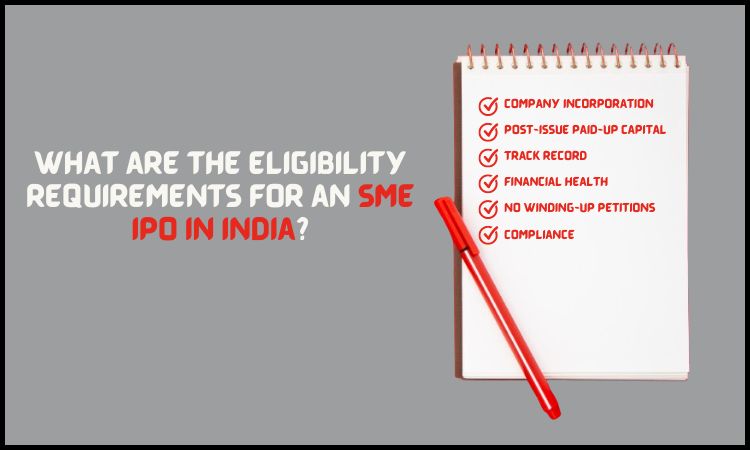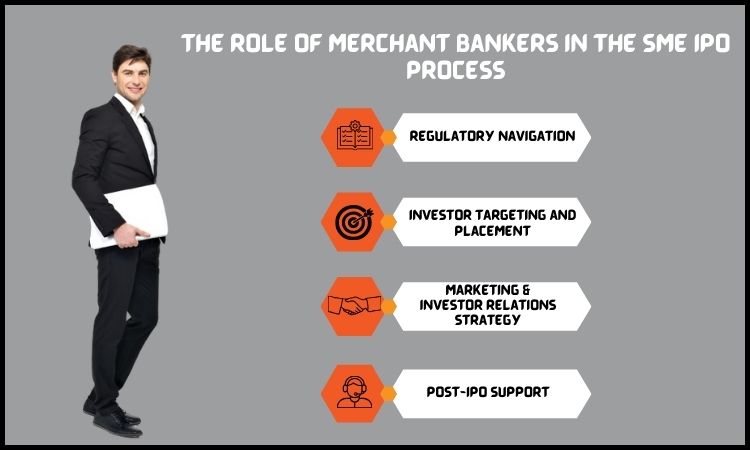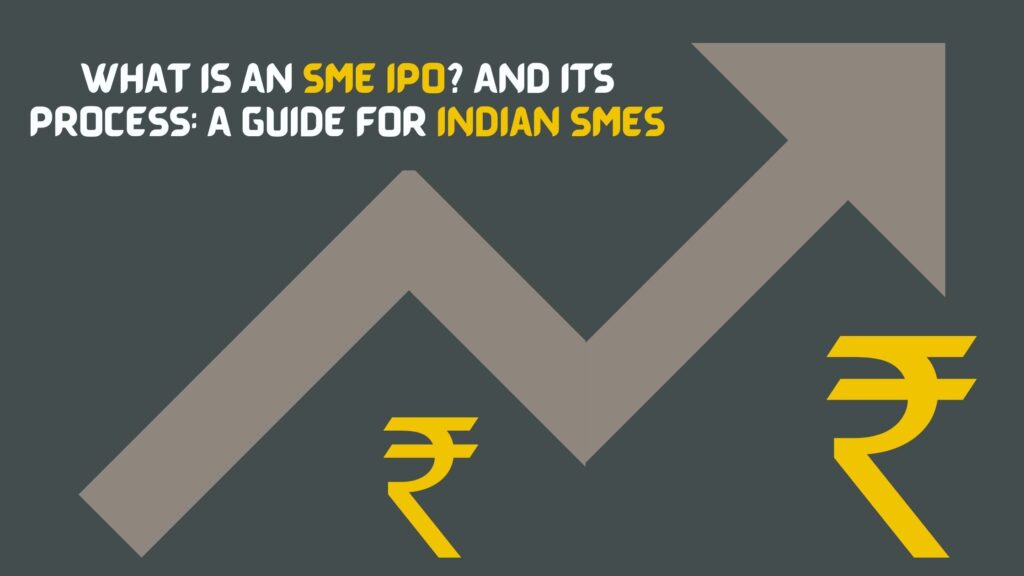Ever dreamed of taking your SME to the big leagues? An SME IPO (Initial Public Offering) might be the answer! An IPO lets you raise capital by selling shares of your company to the public. This can provide the resources you need to grow your business, develop new products, or even acquire other companies.
This guide explains everything SMEs need to know about IPOs. We’ll cover what it takes to qualify, the step-by-step process, and the important role of merchant bankers in making it all happen. By the end, you’ll have a clear understanding of how an SME IPO can be the fuel for your SMEs success story!
Table of Contents
ToggleWhat are the Eligibility Requirements for an SME IPO in India?

Before starting on the exciting journey of an SME IPO, it’s crucial to understand the eligibility criteria set by Indian stock exchanges like BSE SME and NSE Emerge. These requirements ensure companies are financially stable and ready to handle the public ownership that comes with an IPO. The key points are as:
- Company Incorporation: Your SME must be registered under the Companies Act, 1956 or 2013 in India
- Post-Issue Paid-Up Capital: The capital raised through the IPO, combined with your existing capital, should not exceed Rs. 25 crore.
- Track Record: A minimum of three years of successful operation is typically required. Companies formed by converting partnerships/proprietorships/LLPs may need to demonstrate a similar track record in the previous firm.
- Financial Health:
1. Net Worth: Your company should have a positive net worth for at least two out of the preceding three financial years. Net worth refers to your total assets minus total liabilities.
2. Profitability: While it’s not mandatory for all companies, some platforms might prefer SMEs with a history of profitability.
- No Winding-Up Petitions: There shouldn’t be any ongoing winding-up petitions filed against the company by the National Company Law Tribunal (NCLT) or a court.
- Compliance: Your company must be compliant with all relevant regulations and filing requirements set by SEBI (Securities and Exchange Board of India).
Note: Meeting these criteria is the first step towards a successful SME IPO. Remember, these are general guidelines, and specific requirements may vary depending on the chosen platform and industry.
Understanding the SME IPO Process
The SME IPO process involves several key stages, each playing a crucial role in taking your company public. Here’s a breakdown of what to expect on your SME IPO journey:
1. Planning & Preparation
- Self-Assessment: This initial stage involves evaluating your company’s suitability for an IPO. A merchant banker can help analyze your financial health, growth potential, and overall readiness for public ownership.
- IPO Team Assembly: With your merchant banker’s guidance, you’ll assemble a team of experts including lawyers, auditors, and other professionals needed to navigate the IPO process.
- Merchant Banker Selection: Choosing the right merchant banker is crucial. They act as your trusted advisor throughout the journey. Look for a merchant banker with experience in your industry and a strong track record of successful SME IPOs.
2. Documentation & Filings
- Draft Red Herring Prospectus (DRHP): This detailed document provides potential investors with all essential information about your company, financials, business plan, and risk factors. Your merchant banker will guide you in crafting a compelling and compliant DRHP.
- SEBI Filings: The DRHP needs to be submitted to SEBI for review and approval. Your merchant banker facilitates this process and ensures all required documents are drafted and filed according to SEBI regulations.
3. Valuation & Pricing
- Company Valuation: Determining the fair market value of your company sets the foundation for IPO pricing. Merchant bankers leverage their expertise and market analysis to arrive at an accurate valuation.
- IPO Pricing Strategy: Using the valuation and considering market conditions, your merchant banker will help you decide the optimal price for your IPO shares, balancing attractiveness for investors with maximizing capital raised.
4. Marketing & Investor Roadshows
- Marketing & Investor Targeting: Reaching out to potential investors is critical for a successful IPO. Your merchant banker will develop a comprehensive marketing strategy targeting the right investor base for your company.
- Investor Roadshows: Your merchant banker will help organize roadshows, presentations, and meetings with potential investors to generate excitement and interest in your IPO offering.
5. Listing & Post-IPO Compliance
- Stock Exchange Listing: Once SEBI approves your IPO, your shares will be listed on the chosen stock exchange platform (BSE SME or NSE Emerge). Your merchant banker will ensure a smooth listing process.
- Post-IPO Compliance: Becoming a public company comes with ongoing reporting and compliance requirements. Your merchant banker can provide guidance on maintaining good corporate governance and adhering to SEBI regulations after the IPO.

The Role of Merchant Bankers in the SME IPO Process
Merchant bankers are your trusted advisors for your SME IPO journey, offering a range of services to ensure success. Their expertise covers key areas like regulatory compliance, financial guidance, investor targeting, and marketing strategy.
- Regulatory Navigation: SEBI regulations governing SME IPOs are complex and ever-evolving. Merchant bankers possess a deep understanding of these regulations and ensure your IPO adheres to all compliance requirements.
- Investor Targeting and Placement: A successful IPO depends on finding the right investors. Merchant bankers utilize their extensive network and market knowledge to identify and connect you with potential investors who are a good fit for your company’s growth.
- Marketing & Investor Relations Strategy: Building a compelling narrative and effectively communicating your company’s value proposition to investors is paramount. Merchant bankers create a robust marketing strategy and facilitate investor roadshows to generate enthusiasm for your IPO.
- Post-IPO Support: Becoming a public company carries ongoing reporting and compliance obligations. Merchant bankers offer valuable guidance in maintaining good corporate governance practices and navigating the post-IPO regulatory landscape.
Conclusion
An SME IPO can be a powerful growth engine for your Indian business. By understanding the process and leveraging the expertise of a trusted advisor like Marcken Consulting, you can navigate the journey with clarity and confidence.
Our team’s combined expertise in valuation, finance, and merchant banking ensures a smooth and successful IPO experience.
Frequently Asked Questions
Q1. Can I go public through an IPO if my company is very new?
An established track record (3+ years) is generally preferred for SME IPOs. Marcken Consulting can advise on alternative funding options for young companies.
Q2. What happens to my existing shareholders after an IPO?
Existing shareholders can choose to sell some or all of their shares during the IPO or retain them for potential future growth.
Q3. Is an IPO the only way to raise capital for my SME?
No, there are various funding options like venture capital, angel investors, or bank loans. Marcken Consulting can help you explore the best fit for your needs.


